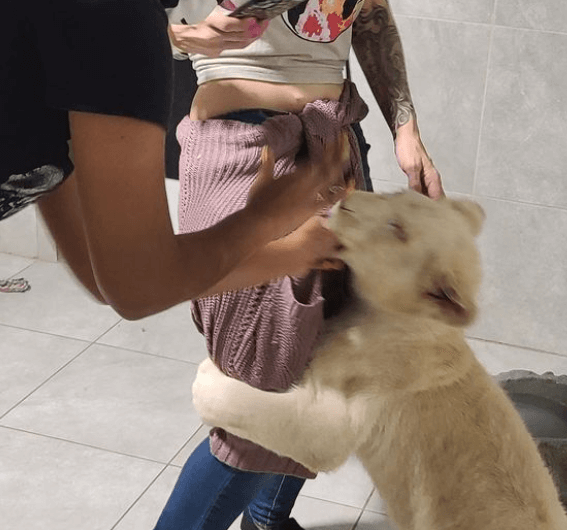Dangerous, Hands-On Encounters; Customers Bitten by Big Cats: PETA Exposes Zoological Wildlife Foundation
In the past, PETA has alerted the U.S. Department of Agriculture (USDA) to Instagram posts showing dangerous, hands-on public encounters with lion cubs at Mario Tabraue’s Miami roadside zoo, the Zoological Wildlife Foundation (ZWF)—a facility featured in Tiger King. Following PETA’s outreach, the USDA cited ZWF numerous times over concerning violations of the federal Animal Welfare Act (AWA).
The agency issued critical citations to ZWF on July 15, 2021, for the following violations:
- Failing to ensure the safety of animals and the public, after a lion cub bit a guest during a hands-on encounter
- Failing to maintain dangerous animals under the direct control of a handler, after ZWF allowed public contact with a large lion cub over 16 weeks of age

A July 2021 inspection report confirmed that the USDA slapped ZWF with several citations for failing to meet even the minimum requirements of the AWA and for not having an enrichment program for primates. In a rare move, the agency went a step further—it issued the roadside zoo an official warning over the incidents. This means that if these violations reoccur, ZWF could face civil penalties or other sanctions, including criminal prosecution.
A February 2023 inspection report revealed that the USDA had slapped ZWF with two new critical citations for violations of the AWA related to dangerous animal interactions, including the following:
- An incident in which a guest was bitten by a lion cub
- One incident in which a guest was allowed to enter a clouded leopard’s enclosure and engage in direct contact with the unrestrained animal and another incident in which a guest was allowed to approach the perimeter of a tiger enclosure and put their hand against the cage wire with no safety barrier in place
During the inspection, ZWF was cited for failing to keep multiple enclosures clean and in good repair.
The USDA previously cited ZWF in relation to its primate housing: It confined two incompatible macaques together, and one chased and bit the other, leaving her with bleeding wounds.
Animals Bite Humans at Zoological Wildlife Foundation: A Troubling History
In 2014, a tiger at ZWF Miami bit off a construction worker’s thumb after the man put his hand into a cage.
In 2020, the Florida Fish and Wildlife Conservation Commission (FWC) issued the facility a written warning after a child was bitten by a juvenile chimpanzee named Limbani.
At the time, the FWC advised ZWF to stop allowing public contact with the 40 plus–pound chimpanzee, but evidence from social media indicates that the roadside zoo allowed members of the public to have full contact with him since then—even as he grew larger, stronger, and more dangerous.
Limbani is now old enough that, in nature, he would’ve weaned from his mother and become more independent. Unfortunately, ZWF stole him from his mom when he was just an infant. He’s never lived in a social group with his mother or siblings as he should have.
Mario Tabraue: Zoological Wildlife Foundation (ZWF) Owner Has a Long Rap Sheet
The owner of ZWF is felon Mario Tabraue of Tiger King infamy, a man whose current business model centers on exploiting baby exotic animals for publicity stunts and dangerous, hands-on encounters with the public.
In the 1980s, Tabraue’s exotic-animal business served as a front for his drug-smuggling enterprise. He was sentenced to 100 years in prison for convictions of racketeering and narcotics violations and was implicated in the dismemberment and burning of the remains of a former federal informant. However, Tabraue was released after serving only 12 years when he testified against other criminals.
How Animals Suffer at ZWF Miami and Other Roadside Zoos
Big cats and chimpanzees are intelligent, self-aware animals. Those held at profit-hungry tourist attractions—even some that are deceptively called “sanctuaries” or “rescues”—endure heartbreaking physical and psychological abuse that’s inflicted in order to force them to tolerate direct contact with the public. It’s little wonder that so many reach their breaking point.
What You Can Do
Never buy a ticket to roadside zoos that allow dangerous, hands-on contact with big cats or other species. Encourage your friends, family members, and social media followers to do the same.

